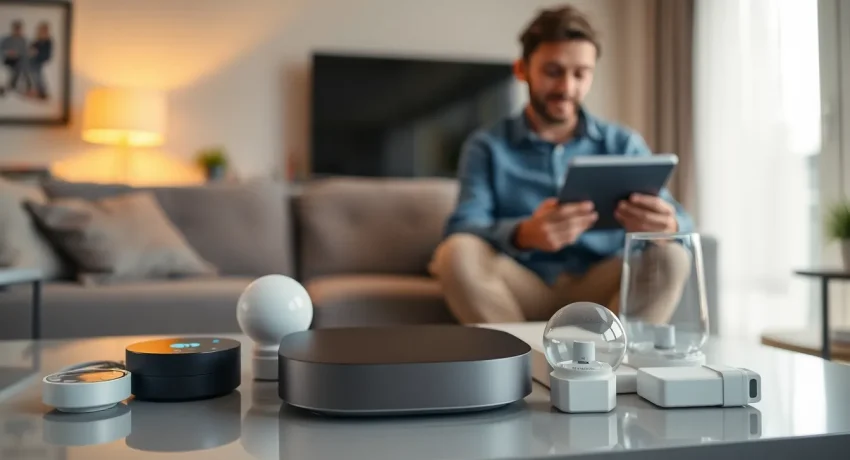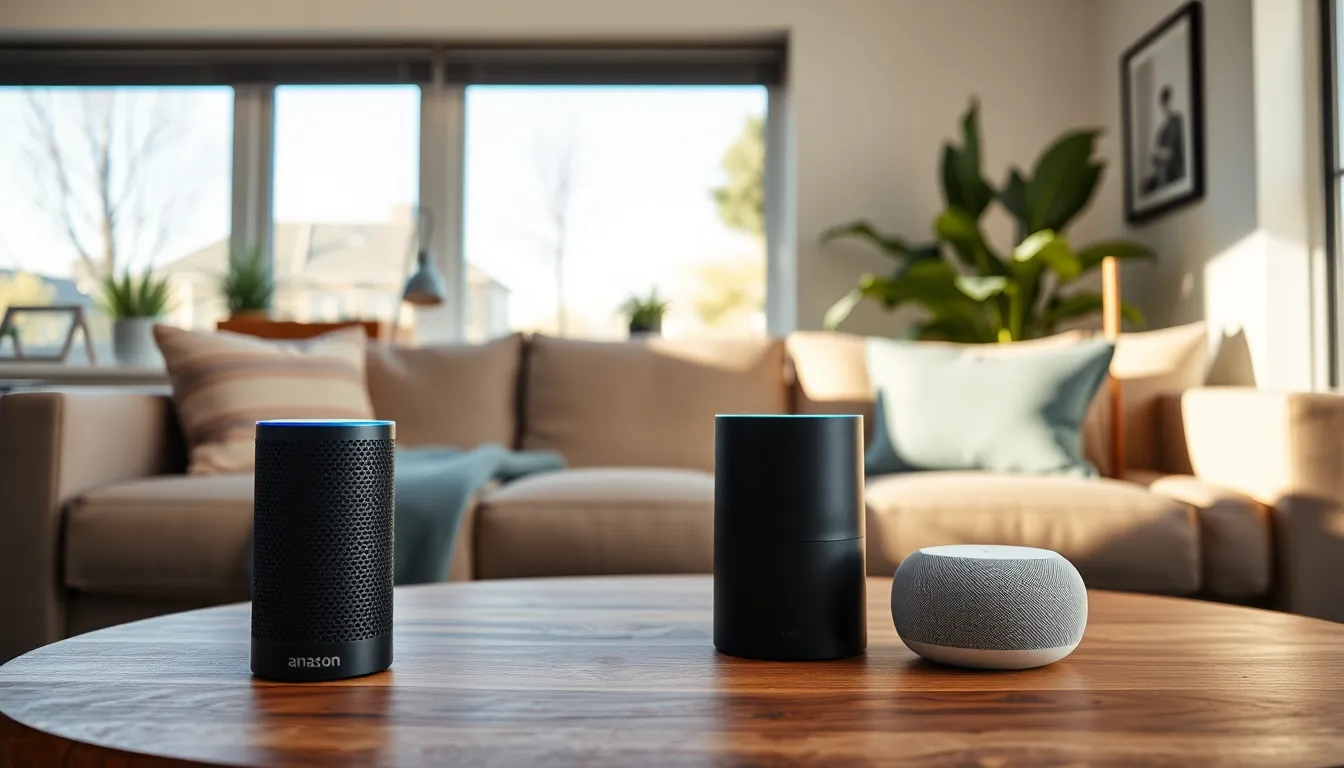Table of Contents
ToggleIn a world where smart homes are becoming the norm, the quest for the perfect smart hub can feel like searching for a needle in a haystack. With so many options promising to connect everything from your coffee maker to your cat’s litter box, it’s easy to get overwhelmed. But don’t worry—there’s life beyond the mainstream hubs that everyone seems to rave about.
Overview of Smart Hubs
Smart hubs facilitate communication between various smart devices within a home. They serve as a central point for managing and controlling devices like lights, thermostats, and security cameras. Many users find themselves overwhelmed by the choices available, which include options from both major brands and less-known alternatives.
Each smart hub typically supports different ecosystems, such as Amazon Alexa, Google Assistant, and Apple HomeKit. Popular options like Samsung SmartThings and Wink offer compatibility with numerous devices. However, some users prefer alternatives that might better suit their specific needs.
Device compatibility remains a critical factor when selecting a smart hub. Some hubs support a wider range of devices, while others focus on specific brands or types. This variation can impact functionality and ease of use.
User interface significantly affects the overall experience. Many smart hubs provide mobile or web apps that allow users to control their devices. A few alternatives have gained attention for their intuitive design and user-friendly features, making them appealing choices.
Connectivity options also play a vital role. Smart hubs may use Wi-Fi, Zigbee, Z-Wave, or Bluetooth technology. Recognizing which protocol aligns with existing devices can influence the selection of a smart hub.
Cost considerations vary among smart hubs, with prices ranging from basic models to high-end options. Budget-friendly models typically provide essential features, while premium hubs may offer advanced capabilities like automation and voice control.
Exploring various alternatives presents opportunities to find solutions tailored to unique preferences. Each hub’s features, compatibility, and pricing create distinct choices for managing smart home ecosystems effectively.
Popular Smart Hub Alternatives
Several smart hub alternatives cater to various user preferences and needs. The following options expand the possibilities for managing smart homes seamlessly.
Amazon Echo
Amazon Echo serves as a well-known smart speaker that integrates Alexa voice assistant capabilities. Users enjoy controlling compatible devices through voice commands, making daily tasks more convenient. This hub supports numerous smart home devices, providing compatibility with brands like Philips Hue and Ring. Its robust feature set includes music streaming and skills for enhanced interactivity. The Echo’s user-friendly app allows for easy setup and management, appealing to both tech-savvy individuals and beginners.
Google Nest Hub
Google Nest Hub stands out as a versatile display hub that simplifies smart home control. With Google Assistant integrated, users can manage devices, access calendar events, and enjoy multimedia content in a visually rich format. This hub connects seamlessly with Google-compatible devices, ensuring a cohesive smart home experience. Users often appreciate the ability to view camera feeds and control lights through an intuitive touchscreen. Designed for voice commands and screen interaction, this hub offers a satisfying and engaging user experience.
Apple HomePod
Apple HomePod serves as an excellent choice for users immersed in the Apple ecosystem. Siri integration allows for effortless voice control of smart devices within the home. This hub provides high-quality audio for music lovers while interfacing smoothly with HomeKit-compatible devices. Enhanced privacy features and user data security make it appealing to privacy-conscious individuals. The HomePod also supports multi-room audio setups, creating a harmonious sound experience throughout the home.
Niche Smart Hub Alternatives
Users seeking unique smart hub solutions often turn to specific alternatives that cater to distinct needs. These options provide specialized features not found in mainstream products.
Samsung SmartThings
Samsung SmartThings excels in device compatibility, supporting a wide range of smart products. Users appreciate its ability to integrate devices from various brands, creating a cohesive ecosystem. With a user-friendly app, managing smart home setups becomes seamless. SmartThings also offers robust automation capabilities, allowing customized routines and schedules. The platform supports Zigbee and Z-Wave, enabling connections to numerous smart devices. Advanced features, such as energy monitoring, further enhance its appeal. Samsung SmartThings provides a reliable option for those seeking flexibility and versatility in their smart home devices.
Hubitat Elevation
Hubitat Elevation stands out for local processing, ensuring faster response times without reliance on cloud services. This smart hub prioritizes user privacy by maintaining data locally. Extensive device compatibility allows integration with Zigbee and Z-Wave networks. Users can create complex automation rules without internet dependency, benefiting from its robust capabilities. The interface offers significant customization, enabling tailored experiences. Hubitat’s focus on user control enhances its value for tech-savvy users. Overall, Hubitat Elevation provides a powerful alternative for those wanting high performance and privacy in their smart home management.
Factors to Consider When Choosing
Choosing the right smart hub involves several key factors that can significantly impact the user experience and overall smart home functionality.
Compatibility with Devices
Compatibility with a wide range of devices is crucial when selecting a smart hub. Many hubs support ecosystems like Amazon Alexa, Google Assistant, and Apple HomeKit, ensuring broad integration. Users should check the compatibility list of each hub to confirm it supports their existing devices. Hubs that accommodate multiple protocols like Zigbee and Z-Wave enhance versatility. Popular options, such as Samsung SmartThings, excel at providing extensive device support, making them ideal for users with diverse smart products.
User Interface and Usability
User interface and usability play significant roles in maximizing the smart home experience. Intuitive apps simplify device management, allowing users to control devices effortlessly. Clarity in navigation ensures users can easily access features and automation settings. Hubs with responsive mobile or web applications create seamless interactions. A simple layout enhances the experience, especially for technology newcomers. Enhanced usability can lead to higher satisfaction and encourage users to explore advanced functionalities.
Price vs. Features
Price versus features is always a consideration in smart hub selection. Budget-friendly models often provide essential functionalities, while premium hubs offer advanced capabilities. Evaluating what features genuinely enhance the smart home experience influences decision-making. A higher price tag may reflect additional support for more devices or advanced automation options. Users should assess their specific needs and weigh them against the cost to find the right balance. Ultimately, understanding this trade-off helps users make informed choices aligned with their preferences and budgets.
Conclusion
Finding the right smart hub can significantly enhance the smart home experience. With numerous alternatives available users can discover options that align with their specific needs and preferences. Each alternative offers unique features and functionalities that cater to different ecosystems and use cases.
By considering factors like device compatibility user interface and cost users can make informed choices that optimize their home automation. Exploring various smart hub alternatives opens the door to personalized solutions that not only simplify device management but also elevate the overall smart home experience. Embracing these alternatives empowers users to create a connected environment that truly reflects their lifestyle.





